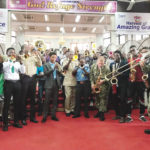BANKOLE Folorunso Adedayo was my blood brother. Born in 1973, he was a soldier of the 1 Brigade, Nigerian Army, Sokoto. In 2000, a terse posted letter arrived the News Room of the ANN Plc., publishers of the Tribune newspaper, my erstwhile employer, from his own employer which shattered the walls and world of my family. He had been killed in the thick of fighting in the Sierra Leonean war, so said the letter to me, his next of kin. Till now, that terse 2-paragraph omnibus letter is all that has transpired between our family and the Nigerian Army, 19 years after. The date he died, how he died, his corpse and all that happened are swallowed in the bowels of the Nigerian Army. Nothing can be more painful than knowing that the Nigerian Army reduced my beloved brother to a one-paragraph letter.
A few days back, the highly influential Wall Street Journal caused a furore when it alleged that over 1000 Nigerian soldiers were secretly buried at night in unmarked graves recently at the Maimalari barracks, Maiduguri. If you are one of the defenders of our Defence Headquarters and rubbishing the report because you are a Peoples Democratic Party (PDP) or All Progressives Congress (APC) faithful, draw your chair closer and let us talk. I have walked that painful path before. WSJ brought back afresh the wound in the heart of our family. You can imagine millions of families secretly sobbing at the avoidable deaths of their loved ones who strayed into the Nigerian Army either out of love, joblessness or patriotism.
Bankole had joined the Army barely a year before. Jobless after school, I was shocked one day when, upon arrival at home when I heard that he had joined the Army and had been posted to Sokoto. Less than six months of his joining the Army, a letter arrived from him. With no training and no experience, the 27-year old was right inside a forest near Freetown where a military jet which airlifted him and his rookie compatriots had dropped them. They were in the forest for about a month, feeding on raw cassava and fruits. No food, no water. When the soldiers eventually entered Freetown, he called me fairly regularly on Tribune’s telephone number to ask us to pray for him. I broke down one day when, in the background, I heard rat-a-tat volleys of guns. We were glad when, a few months after, he came home, dressed in the green overall uniform of the Nigerian Army. He was proud of it. He had taken excuse duty from Freetown. He regaled us with grisly stories of how hundreds of his colleagues were killed by Foday Sankoh and another rebel commander called General Mosquitoes. He returned to Sierra Leone two weeks after. And that was the last we ever saw of him. Or his remains.
Death blew vuvuzela in my father’s compound and all its emissaries – sorrow, tears, wailing and agony – converged to hold their dreadful meeting. It became their temporary place of domicile. Sure they had got another colony to temporarily occupy, they sat regally like a royal bard who had come to pay the village bridegroom a surprise visit. Residents, passersby and the entire neighborhood knew we had been visited by strange guests who served us grisly dinner of tears, wailing and gnashing of teeth. Those who could roll on the floor did without a care in the world; those whose modus operandi of acknowledging the thorny handshake of our uninvited guests was to wail, wailed like a sparrow whose child had just been shot dead by a slingshot. You didn’t need anyone to tell you death had given us the bitter end of meadows to chew.
A few hours earlier, I had arrived from Ibadan, the capital of Oyo State, with a piece of news for my father and mother. For hours, agreeing on the mode of its delivery turned me into an effeminate little urchin. The Nigerian Army, with that eerie, blood-red logo of its, a diffident eagle perching on a crest like a bird of passage, had just sent me by post a letter which sent sorrow coursing deep down into my marrows. My younger brother, the terse and incorrigibly unsympathetic two-paragraph letter had volunteered, had been missing in action in the Sierra-Leonean war. It broke the boundaries of my English Language mastery. What did the English mean to say someone was missing in action? I asked restlessly, amid a pall of sorrow that enveloped me. Some said ‘Missing in Action’ was an euphemism for my brother having died; others said he had probably gone AWOL and some others said the Nigerian Army, incompetent like everything Nigerian, probably couldn’t find him in a few weeks and concluded that he was missing. I put a call to his Sokoto Army base and ambivalence was the echo that rang in my ears. So, dejected, emotionally calibrated, I had come to hand over the terse letter to my parents about the death of a child they couldn’t hide the fact that, in his lifetime, he was one they loved most of my siblings and me. That was the last interface between the Nigerian Army and us – Bankole’s family. No commiseration, no dime as payment of allowance for his martyrdom; not even the ‘honour’ of ever seeing, perhaps, his mutilated corpse.
When I read the WSJ expose, I imagined how that ululating, tearful dirge that heralded the most sorrowful, most traumatic day ever in the life of my extended family some years back, had been amateurishly cloned and played in thousand homes across Nigeria. WSJ, writing in a very descriptive, difficult-to-disbelieve prose, clearly articulated the peremptoriness, the casual murder of our sons and daughters in a war which the Commander-in-Chief of the Nigerian Armed Forces, General Muhammadu Buhari, had off-handedly dismissed as having been won by Nigeria. Even if you are as unfeeling as to be able to crush the head of a tortoise with your teeth, you would weep for Nigeria.
It reported a deceased soldier’s wife, Mercy, whose husband, Lance Cpl. Tamuno, had been killed by Boko Haram terrorists at an outpost in Cross Kauwa, about 100 miles north of Maiduguri, who demanded to see the grave of her husband. “She was taken to the official cemetery at Maimalari, where graves are marked with plywood headstones. There, she was led to a spot marked with a plastic bottle with her husband’s name written on it,” said the report. She told WSJ: “It was the only one marked in this way. I’m not sure it was his grave but that’s what the army told me.” Tamuno’s soldier mates from his unit reportedly said he had been buried days earlier in the secret graveyard.
Not having the capacity to disappoint its greatest critics, the Nigerian Army rolled in its familiar Armored Tank of phantasm. I have read the release from the Acting Director, Defence Information, Col. Onyema Nwachukwu and nowhere was there a denial of the alleged 1000-plus casualties. The Army was more bothered about a pitiable relic of British bequeathal of giving dead soldiers befitting ceremonial funeral which it said it still upholds.
Between WSJ and the Nigerian Army, Nigerians know whose averment to believe and whose, ab-initio, is prone to lies. The Nigerian establishment lives a life of abysmal lie-telling, its daily activities riddled with reeling out tissues of untruth, falsehood to its constituents. If, in 1914, Clara Shaw had an inkling of today’s Nigerian Army, she should have conveniently and aptly christened Nigeria, Liegeria. If you conduct opinion polls on people’s perception of their government, you would find out that Nigerians who believe that their governments live a life of lie are about 99 per cent. President Buhari, Army chiefs and erstwhile Minister of Information, (the latter curiously said recently that he was surprised his grandchild demanded the ontology of the inflection of Lie from his Lai name) had all told us that Boko Haram insurgents had been “technically” defeated.
Exactly a week ago today, selfsame Boko Haram insurgents opened fire on a funeral on the outskirts of this same Maiduguri, and at least 65 people, according to a conservative estimate, were killed. Hundreds of such routs with astoundingly eerie fatalities are daily shrouded off our views. The victims are secretly buried and their families mourn their losses. Some children can never get it right again in life, as a result of these losses. Yet, Army Generals feed fat on the manures of the daily routed soldiers like toads of war. WSJ further revealed that “the insurgents now control hundreds of square miles of territory across four countries around the Lake Chad basin…” yet Buhari and his army claim that not even a parcel of the Nigerian territory is in the hands of the accursed blood-suckers.
The believability of WSJ claims is strengthened by empirical evidence that can be corroborated by science, decades of news integrity and logical sequence of how the news medium must have arrived at the claims. On the reverse, the Nigerian Army’s only tissue of rebuttal – if one can access its thought process – is, that weather-beaten imperial thesis of subtle subjugation of Africa, decades after the end of colonialism. Shortly after independence, we came to find out, to our chagrin, that that hogwash won’t wash any longer; that our greatest threats are actually the imperialists within. One of the imperialists is the platoon of multiple-epaulettes military officers with big fat stomachs – apologies to Fela Anikulapo Kuti – and their abettors in Government Houses.
Chief among the loci of information-gathering mechanism for White House, 10 Downing Street and other world capitals about occurrences in the Third World are donor agencies and Non-Governmental Organizations. Western governments fund them heavily. They penetrate nooks and crannies of government, agencies and parastatals to funnel out information which are sent to their home countries. They have access to sophisticated monitoring equipment. More importantly, the agencies identify critical, but most times disgruntled actors who supply them information at nocturnes. They get information of dalliances between top military officers and the insurgents through which the insurgents get critical information with which they launch their offensives. They get information that fat-stomached military officers, in cahoots with officials of government, sit on billions of naira meant to buy military hardware, thereby subjecting fighting soldiers to a hara-kiri in the hands of well-equipped insurgents. In its lazy rebellion against this sustained system, the Nigerian Army attempts to fight the agencies which have been able to, in the last decade of the metastasis of the Boko Haram insurgency, funnel damaging and critical information out which landed on the laps of decision-makers of the world. For a Nigerian Army whose operations are garnished with crude inhumanity of man towards his fellow man, allegation of imperial poke-nose is always available to express its frown at the donor agencies.
In 2018, Brigadier General Sani Usman Kuka, the Army spokesman, issued a statement laced with a charge against Amnesty International (AI’s) operations in the Northeast, particularly in Maiduguri, the birthplace of Boko Haram. In another statement signed by Sani Kukasheka Usman, Brigadier General and Director Army Public Relations on December 17, 2018, the Army claimed that it had “credible information that the Nigerian branch… is determined to destabilise the Nigerian nation… through fabrication of fictitious allegations of alleged human rights abuses against the Nigerian security forces and clandestine sponsorship of dissident groups to protest, as well as unfounded allegations against the leadership of the Nigerian military.” A few days ago, your-guess-is-good-as-mine gathered some apparently paid protesters to demand that AI should leave Nigeria.
As if responding to the stimuli of violence across the country that is mounting by the day, at the tail end of last week, one pastor of the Redeemed Christian Church of God and four others were abducted by kidnappers, prompting the church’s G. O, E. A. Adeboye, to confess that he had never witnessed this level of insecurity in Nigeria. Yet, a top pastor of that same church who is Nigeria’s Vice President, was on a visit to the United States a few months back where he told America that the stories of violence and kidnap in Nigeria were over-bloated. Unfortunately for the VP, the American power apparatchik that he was bayoneting with such volleys of lies is in possession of the minutest details of avoidable killings that have become hourly occurrences in Nigeria.
May the soul of Bankole, the thousand secretly buried in the graveyards of Maimalari Military Barracks in Maiduguri and the other cemeteries in the North East find peace with their Creator. May God give the Lie-gerian Army, its C-in-C and their commissars of lies the humility of spirit to acknowledge that in Boko Haram of the Northeast, bandits of the Northwest and herdsmen terrorists of the South, mixed with their gross ineptitude, eerie silence, abetment of the villains and morbid incapacity, they have turned our lands into burial fields.






